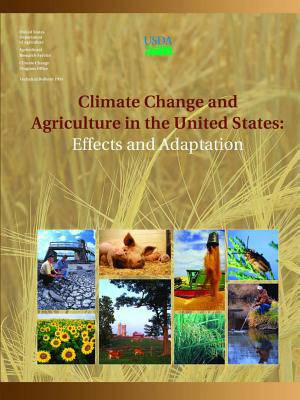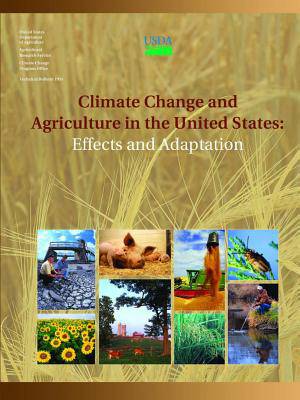
Door een staking bij bpost kan je online bestelling op dit moment iets langer onderweg zijn dan voorzien. Dringend iets nodig? Onze winkels ontvangen jou met open armen!
- Afhalen na 1 uur in een winkel met voorraad
- Gratis thuislevering in België vanaf € 30
- Ruim aanbod met 7 miljoen producten
Door een staking bij bpost kan je online bestelling op dit moment iets langer onderweg zijn dan voorzien. Dringend iets nodig? Onze winkels ontvangen jou met open armen!
- Afhalen na 1 uur in een winkel met voorraad
- Gratis thuislevering in België vanaf € 30
- Ruim aanbod met 7 miljoen producten
Zoeken
Climate Change and Agriculture in the United States
Effects and Adaptation
U S Department of Agriculture
Paperback | Engels
€ 32,95
+ 65 punten
Omschrijving
Increases of atmospheric carbon dioxide (CO2), rising temperatures, and altered precipitation patterns will affect agricultural productivity. Increases in temperature coupled with more variable precipitation will reduce productivity of crops, and these effects will outweigh the benefits of increasing carbon dioxide. Effects will vary among annual and perennial crops, and regions of the United States; however, all production systems will be affected to some degree by climate change. Agricultural systems depend upon reliable water sources, and the pattern and potential magnitude of precipitation changes is not well understood, thus adding considerable uncertainty to assessment efforts. Livestock production systems are vulnerable to temperature stresses. An animal's ability to adjust its metabolic rate to cope with temperature extremes can lead to reduced productivity and in extreme cases death.
Specificaties
Betrokkenen
- Auteur(s):
- Uitgeverij:
Inhoud
- Aantal bladzijden:
- 194
- Taal:
- Engels
Eigenschappen
- Productcode (EAN):
- 9781329660236
- Verschijningsdatum:
- 31/10/2015
- Uitvoering:
- Paperback
- Formaat:
- Trade paperback (VS)
- Afmetingen:
- 216 mm x 279 mm
- Gewicht:
- 462 g

Alleen bij Standaard Boekhandel
+ 65 punten op je klantenkaart van Standaard Boekhandel
Beoordelingen
We publiceren alleen reviews die voldoen aan de voorwaarden voor reviews. Bekijk onze voorwaarden voor reviews.











